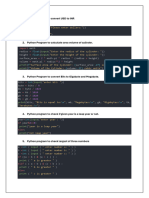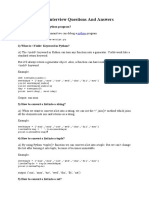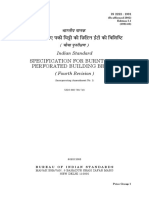python practical
Uploaded by
racer9309python practical
Uploaded by
racer9309Section 1: Basic Python Programs
1. Python program to print Hello world!
print("Hello, world!")
2. Python program to add two numbers
# Add two numbers
num1 = 3
num2 = 5
sum = num1 + num2
print("The sum is:", sum)
3. Python program to find the square root
import math
# Find the square root
num = 16
sqrt = math.sqrt(num)
print("The square root is:", sqrt)
4. Python program to calculate the area of a triangle
# Calculate area of a triangle
base = 5
height = 10
area = 0.5 * base * height
print("The area of the triangle is:", area)
5. Python program to swap two variables
# Swap two variables
a=5
b = 10
a, b = b, a
print("a =", a, "b =", b)
Section 2: Python Conversion Programs
1. Python program to convert kilometres to miles
#Convert kilometers to miles
km = 5
miles = km * 0.621371
print(km, "kilometers is equal to", miles, "miles")
2. Python program to convert Celsius to Fahrenheit
# Convert Celsius to Fahrenheit
celsius = 25
fahrenheit = (celsius * 9/5) + 32
print(celsius, "degrees Celsius is equal to", fahrenheit, "degrees Fahrenheit")
3. Python program to convert decimal to binary, octal and hexadecimal
# Convert decimal to binary, octal and hexadecimal
decimal = 10
print("Binary:", bin(decimal))
print("Octal:", oct(decimal))
print("Hexadecimal:", hex(decimal))
4. Python program to find ASCII value of character
# Find ASCII value of character
char = 'A'
print("The ASCII value of", char, "is", ord(char))
5. Python program to implement type conversion
# Type conversion examples
integer = 10
float_num = float(integer)
string = str(integer)
print("Integer:", integer)
print("Converted to float:", float_num)
print("Converted to string:", string)
Section 3: Basic Mathematical Programs
1. Python program to check Armstrong number
# Check if a number is an Armstrong number
num = 153
sum = 0
temp = num
while temp > 0:
digit = temp % 10
sum += digit ** 3
temp //= 10
if num == sum:
print(num, "is an Armstrong number")
else:
print(num, "is not an Armstrong number")
2. Python program to check if a number is odd or even
# Check if a number is odd or even
num = 4
if num % 2 == 0:
print(num, "is an even number")
else:
print(num, "is an odd number")
3. Python program to check leap year
#Check if a year is a leap year
year = 2020
if (year % 4 == 0 and year % 100 != 0) or (year % 400 == 0):
print(year, "is a leap year")
else:
print(year, "is not a leap year")
4. Python program to find the largest among three numbers
# Find the largest among three numbers
a=5
b = 10
c=8
largest = max(a, b, c)
print("The largest number is", largest)
5. Python program to check prime number
# Check if a number is prime
num = 29
if num > 1:
for i in range(2, int(num / 2) + 1):
if (num % i) == 0:
print(num, "is not a prime number")
break
else:
print(num, "is a prime number")
else:
print(num, "is not a prime number")
Section 4: Python program on list
1. Python program to check if a list is empty
def is_list_empty(lst):
return not lst
my_list = []
print("Is the list empty?", is_list_empty(my_list))
2. Python program to access index of a list using for loop
my_list = ['a', 'b', 'c']
for index, value in enumerate(my_list):
print("Index:", index, "Value:", value)
3. Python program to slice list
my_list = [1, 2, 3, 4, 5]
sliced_list = my_list[1:4]
print("Sliced List:", sliced_list)
4. Python program to concatenate two lists
list1 = [1, 2, 3]
list2 = [4, 5, 6]
concatenated_list = list1 + list2
print("Concatenated List:", concatenated_list)
5. Python program to remove duplicate element from a list
my_list = [1, 2, 2, 3, 4, 4, 5]
unique_list = list(set(my_list))
print("List without duplicates:", unique_list)
Section 5: Python program on dictionary
1. Python program to merge two dictionaries
dict1 = {'a': 1, 'b': 2}
dict2 = {'c': 3, 'd': 4}
merged_dict = {**dict1, **dict2}
print("Merged Dictionary:", merged_dict)
2. Python program to iterate over dictionary using for loop
my_dict = {'a': 1, 'b': 2, 'c': 3}
for key, value in my_dict.items():
print("Key:", key, "Value:", value)
3. Python program to sort a dictionary by value
my_dict = {'a': 3, 'b': 1, 'c': 2}
sorted_dict = dict(sorted(my_dict.items(), key=lambda item: item[1]))
print("Sorted Dictionary by Value:", sorted_dict)
4. Python program to delete an element from a dictionary
my_dict = {'a': 1, 'b': 2, 'c': 3}
if 'b' in my_dict:
del my_dict['b']
print("Dictionary after deletion:", my_dict)
5. Python program to check if a key is already present in a dictionary
my_dict = {'a': 1, 'b': 2, 'c': 3}
key_to_check = 'b'
if key_to_check in my_dict:
print(f"Key '{key_to_check}' is present in the dictionary.")
else:
print(f"Key '{key_to_check}' is not present in the dictionary.")
Section 6: Python program on string
1. Python program to check if given string is palindrome or not
def is_palindrome(s):
return s == s[::-1]
my_string = "radar"
print("Is the string palindrome?", is_palindrome(my_string))
2. Python program to capitalize the first character of a string
my_string = "hello world"
capitalized_string = my_string.capitalize()
print("Capitalized String:", capitalized_string)
3. Python program to compute all the Permutation of the String
from itertools import permutations
my_string = "abc"
perm = [''.join(p) for p in permutations(my_string)]
print("All Permutations:", perm)
4. Python program to create a countdown timer
import time
def countdown(seconds):
while seconds:
mins, secs = divmod(seconds, 60)
timer = '{:02d}:{:02d}'.format(mins, secs)
print(timer, end="\r")
time.sleep(1)
seconds -= 1
print("Time's up!")
countdown(10)
5. Python program to count the number of occurrences of a character in string
my_string = "hello world"
char_to_count = 'o'
count = my_string.count(char_to_count)
print(f"The character '{char_to_count}' occurs {count} times in the string.")
Section 7: Python program on tuple
1. Python program to find the size of a tuple
my_tuple = (1, 2, 3, 4, 5)
print("Size of the tuple:", len(my_tuple))
2. Python program for adding a tuple to list and vice-versa
my_list = [1, 2, 3]
my_tuple = (4, 5, 6)
# Adding tuple to list
combined_list = my_list + list(my_tuple)
print("List after adding tuple:", combined_list)
# Adding list to tuple
combined_tuple = tuple(my_list) + my_tuple
print("Tuple after adding list:", combined_tuple)
3. Python program to sort a list of tuples in increasing order by the last element in each
tuple
my_list_of_tuples = [(1, 3), (2, 2), (3, 1)]
sorted_list_of_tuples = sorted(my_list_of_tuples, key=lambda x: x[-1])
print("Sorted list of tuples:", sorted_list_of_tuples)
4. Python program to assign frequency to tuples
from collections import Counter
my_tuple = (1, 2, 2, 3, 3, 3, 4, 4, 4, 4)
frequency = Counter(my_tuple)
print("Frequency of each element in the tuple:", frequency)
5. Python program to check if any list element is present in tuple
my_list = [5, 6, 7]
my_tuple = (1, 2, 3, 4, 5)
is_present = any(item in my_tuple for item in my_list)
print("Is any list element present in the tuple?", is_present)
You might also like
- Hourglass Workout Program by Luisagiuliet 276% (21)Hourglass Workout Program by Luisagiuliet 251 pages
- The Hold Me Tight Workbook - Dr. Sue Johnson100% (16)The Hold Me Tight Workbook - Dr. Sue Johnson187 pages
- Read People Like A Book by Patrick King-Edited62% (66)Read People Like A Book by Patrick King-Edited12 pages
- Livingood, Blake - Livingood Daily Your 21-Day Guide To Experience Real Health77% (13)Livingood, Blake - Livingood Daily Your 21-Day Guide To Experience Real Health260 pages
- COSMIC CONSCIOUSNESS OF HUMANITY - PROBLEMS OF NEW COSMOGONY (V.P.Kaznacheev,. Л. V. Trofimov.)94% (212)COSMIC CONSCIOUSNESS OF HUMANITY - PROBLEMS OF NEW COSMOGONY (V.P.Kaznacheev,. Л. V. Trofimov.)212 pages
- Donald Trump & Jeffrey Epstein Rape Lawsuit and Affidavits83% (1016)Donald Trump & Jeffrey Epstein Rape Lawsuit and Affidavits13 pages
- The 36 Questions That Lead To Love - The New York Times94% (34)The 36 Questions That Lead To Love - The New York Times3 pages
- The 36 Questions That Lead To Love - The New York Times95% (21)The 36 Questions That Lead To Love - The New York Times3 pages
- Jeffrey Epstein39s Little Black Book Unredacted PDF75% (12)Jeffrey Epstein39s Little Black Book Unredacted PDF95 pages
- The 4 Hour Workweek, Expanded and Updated by Timothy Ferriss - Excerpt23% (954)The 4 Hour Workweek, Expanded and Updated by Timothy Ferriss - Excerpt38 pages
- Unit - 1 1.what Are The Features of Python. Explain The PVM. Ans: Following Are Some Important Features of PythonNo ratings yetUnit - 1 1.what Are The Features of Python. Explain The PVM. Ans: Following Are Some Important Features of Python15 pages
- Python Functions and Array - List - Set - Tuples ProgramsNo ratings yetPython Functions and Array - List - Set - Tuples Programs59 pages
- Top 25 Python Coding Questions for InterviewNo ratings yetTop 25 Python Coding Questions for Interview6 pages
- AI PRACTICAL FILE EXPERIMENTS (KCA 351)No ratings yetAI PRACTICAL FILE EXPERIMENTS (KCA 351)33 pages
- 1.python Program To Read and Print Values of Variables of Different DatatypesNo ratings yet1.python Program To Read and Print Values of Variables of Different Datatypes13 pages
- Chandigarh University Python Assignment Sem 4No ratings yetChandigarh University Python Assignment Sem 49 pages
- Lab Manual_ Week 1 - Programming for Artificial IntelligenceNo ratings yetLab Manual_ Week 1 - Programming for Artificial Intelligence8 pages
- Generational Marketing and Its Role in Marketing100% (1)Generational Marketing and Its Role in Marketing2 pages
- API - Gas Lift Manual - Vocational Training SeriesNo ratings yetAPI - Gas Lift Manual - Vocational Training Series759 pages
- Blessed Are Those Who Die in The Lord Bob JenningsNo ratings yetBlessed Are Those Who Die in The Lord Bob Jennings10 pages
- Classroom Observation Assignment-Form 2 Blank 1No ratings yetClassroom Observation Assignment-Form 2 Blank 13 pages
- D5146.360.PDF-Standard Guide To Testing Solvent-Borne Architectural CoatingsNo ratings yetD5146.360.PDF-Standard Guide To Testing Solvent-Borne Architectural Coatings11 pages
- The Prophet by Kahlil Gibran: The Coming of The ShipNo ratings yetThe Prophet by Kahlil Gibran: The Coming of The Ship45 pages
- Livingood, Blake - Livingood Daily Your 21-Day Guide To Experience Real HealthLivingood, Blake - Livingood Daily Your 21-Day Guide To Experience Real Health
- COSMIC CONSCIOUSNESS OF HUMANITY - PROBLEMS OF NEW COSMOGONY (V.P.Kaznacheev,. Л. V. Trofimov.)COSMIC CONSCIOUSNESS OF HUMANITY - PROBLEMS OF NEW COSMOGONY (V.P.Kaznacheev,. Л. V. Trofimov.)
- Donald Trump & Jeffrey Epstein Rape Lawsuit and AffidavitsDonald Trump & Jeffrey Epstein Rape Lawsuit and Affidavits
- The 36 Questions That Lead To Love - The New York TimesThe 36 Questions That Lead To Love - The New York Times
- The 36 Questions That Lead To Love - The New York TimesThe 36 Questions That Lead To Love - The New York Times
- Jeffrey Epstein39s Little Black Book Unredacted PDFJeffrey Epstein39s Little Black Book Unredacted PDF
- The 4 Hour Workweek, Expanded and Updated by Timothy Ferriss - ExcerptThe 4 Hour Workweek, Expanded and Updated by Timothy Ferriss - Excerpt
- Unit - 1 1.what Are The Features of Python. Explain The PVM. Ans: Following Are Some Important Features of PythonUnit - 1 1.what Are The Features of Python. Explain The PVM. Ans: Following Are Some Important Features of Python
- Python Functions and Array - List - Set - Tuples ProgramsPython Functions and Array - List - Set - Tuples Programs
- 1.python Program To Read and Print Values of Variables of Different Datatypes1.python Program To Read and Print Values of Variables of Different Datatypes
- Lab Manual_ Week 1 - Programming for Artificial IntelligenceLab Manual_ Week 1 - Programming for Artificial Intelligence
- API - Gas Lift Manual - Vocational Training SeriesAPI - Gas Lift Manual - Vocational Training Series
- Blessed Are Those Who Die in The Lord Bob JenningsBlessed Are Those Who Die in The Lord Bob Jennings
- D5146.360.PDF-Standard Guide To Testing Solvent-Borne Architectural CoatingsD5146.360.PDF-Standard Guide To Testing Solvent-Borne Architectural Coatings
- The Prophet by Kahlil Gibran: The Coming of The ShipThe Prophet by Kahlil Gibran: The Coming of The Ship























































































































